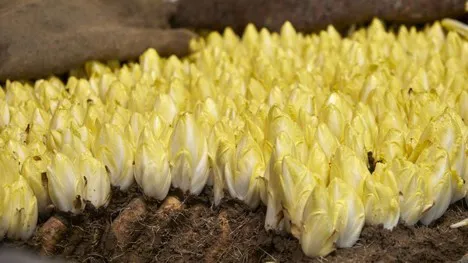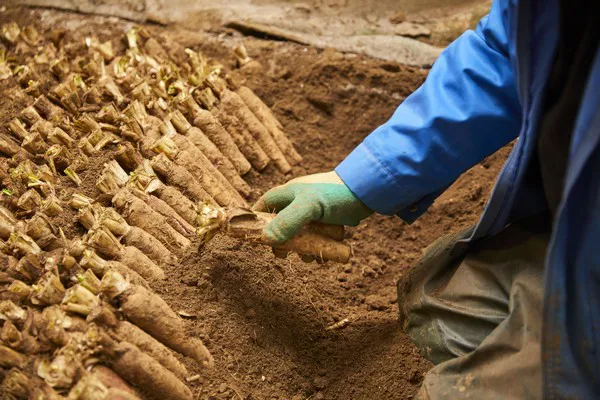This week sees the start of the second Chicory Week in Belgium. This Flanders Agricultural Marketing Board (VLAM) campaign aims to raise awareness of this Belgian pride again, which, it turns out, is indeed necessary. "Long-term consumption figures keep falling," begins VLAM's Nele Van Avermaet.
Herman Lion of the Belgian wholesaler Lathouwers and Co. believes the campaigns should be aimed especially at young people. "Many of them either don't know or don't like chicory. That's where you must create awareness and show them how beautiful this product is," he says.

The season has been quite good so far. Benny Cuypers of the BelOrta cooperative calls the market situation one of a bit of shortage, leading to nice prices. Herman agrees: "The quality's good. December was great, and January sales were good too. Now, however, it seems to be slowing down again. After the holidays, spending is down, and the warmer weather isn't helping chicory consumption either. There are sales, but retail demand leaves something to be desired." An ideal time, it seems, to refocus attention on this 'white gold.'
VLAM will thus always be launching Chicory Week in the first week of February. "We started last year, and from now on, we'll put chicory in the spotlight every year around this time. There increased participation this year. The cooperatives, growers, and farmers union are meeting with us," says Nele.
"We're talking to retailers, municipalities, the hospitality industry, and (wholesale) traders too. We can rightly call it a sector-wide campaign. It's also lively, and we hope for great results." The first edition resulted in a 35% increase in chicory sales. "We must ensure that continues after the promo week," adds Nele.

Convenience and inspiration
That is needed, too, since the sector has not been having an easy time in recent years. Sales and consumption have been steadily declining. According to Nele, shelf space competition is a major cause. "Mainly older people still buy chicory, but that's because the choice of vegetables used to be far more limited. Now, there are so many different options."
"So, perhaps, shoppers are less like to choose chicory. Also, its flavor is an 'issue', with especially children not being fond of it. Finally, of course, it's all about inspiration. Many people know only a few ways of preparing this vegetable, but there are so many possibilities. We, therefore, highlight plenty of dishes to show that chicory isn't a one-hit-wonder," Nele explains.
Herman sees chicory's presentation as the main solution. "Prepared meals are very popular at the moment. Young people want quick and easy. You could offer chicory in this way; it's not that people are eating unhealthier. Products like pre-cooked chicory, which we have, work well."
"You can get it started quickly and get ideas for incorporating chicory into dishes." However, the trader sees a role here for retailers. "Supermarket prices are too high. Chicory is simply too expensive in supermarkets. Growers, and we don't see any of that profit. It seems to put people off from buying this product," adds Herman.

Increased appeal
He adds that there is a vast difference between hydro and soil chicory. "I recently saw hydro chicory being sold for €1.50 per pack, while a pack of soil-grown chicory was going for €4.99. That choice is a no-brainer; price still wins out then. That doesn't help soil-grown chicory growers, whose cultivation is very labor intensive."
Nele agrees. "The number of growers is dwindling because they see no future in chicory cultivation. Still, I'm convinced that Belgian chicory will always exist. People still care about it, and it should actually be highlighted throughout the year. That's difficult. But I'm sure, with this week, we can encourage consumers to prepare something different."
"I want people to get to know chicory and keep buying it more quickly, even after this week. I, thus, want to appeal for as much participation as possible again next year. That will ensure this cultural heritage remains. For now, we're hoping for a wonderful week, which the results will, hopefully, reflect," concludes Nele.
 For more information:
For more information:
Nele Van Avermaet
VLAM
Tel: +32 (0) 248 66 494
Email: nele.vanavermaet@vlam.be
Website: www.vlam.be
Lathouwers en Co![]() 39 Veilinglaan
39 Veilinglaan
1861, Wolvertem (Meise), BE
Tel: +32 (0) 523 97 900
Email: info@lathouwers.net
Website: www.lathouwers.net
